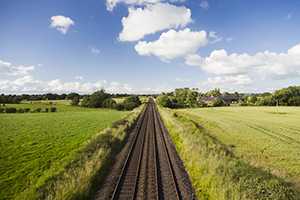Budget 2021: A vital step as the railway works to drive the national recovery from Covid-19
By Andy Bagnall, Director General of the Rail Delivery Group
While the budget obviously centred on the major macro-economic challenges of the Covid-19 pandemic, as I watched the Chancellor deliver his speech today, I was once again reminded of the railway’s importance to the UK’s wider recovery.
It is clear to see that the government is resolutely focused on a strong, green, economic recovery from the pandemic – and the railway will be essential to helping drive that. A healthy railway brings people together, supports businesses and jobs, and offers low-emission travel: three key ingredients that we must bear in mind as we get the country back onto its feet this year.
 As an industry, we are excited by the prospect of helping the national revival, with familiar patterns finally becoming possible once more after a period of uncertainty. So the announcements around financial support for rail in the latest Budget are welcome news – both in the short term and for long term investment.
As an industry, we are excited by the prospect of helping the national revival, with familiar patterns finally becoming possible once more after a period of uncertainty. So the announcements around financial support for rail in the latest Budget are welcome news – both in the short term and for long term investment.
Thanks to the public’s commitment to the rules and the success of the vaccination programme, we are on the brink of relaxed restrictions and the start of a return to shops, restaurants, social gatherings and city centres over the coming months. This physical recovery will spark the nation’s wider economic recovery, and rail can help drive and accelerate this economic growth in a green way. But this depends on people returning to the railway and not the road, which would lead to an environmentally damaging car-led recovery.
To make train travel more attractive we should look at how we can make fares easier for people. This is particularly important as the budget confirmed that fuel duty would be frozen for the eleventh year running in the same week that the government implemented an above-inflation increase in train fares. Having spent billions of pounds keeping trains running during the pandemic it is understandable that the government wants returning passengers to pay their share. However, rebalancing the railway’s finances, and thereby easing the burden on taxpayers, requires more radical solutions. Passengers want an easier fares system and we want to work with government to push forward reform.
Raising the contactless payment limit to £100 can save people time when buying tickets and, if introduced alongside retail reform which sees pay-as-you-go across more of the network, has the potential to transform how far passengers can travel with the tap of their card – changing the game for longer distance commuters and helping to catalyse a truly national recovery. This could change how people think about how they travel by train after the pandemic.
This is one example of why today’s budget matters so much to the railway and its role in the recovery. Rail companies have worked hard throughout the pandemic to make sure passengers can travel with confidence and that the network is ready when restrictions lift to reconnect families and friends, businesses and clients, commercial centres and consumers. To capitalise on that, we now need to make the changes to fares and retail that will entice people back.
The budget also confirmed investment in several rail projects. Funding for the new Global Centre of Rail Excellence in Wales, the re-opening of Okehampton - Exeter to passenger services and the creation of new stations in the West Midlands builds on the continued delivery of improvements by rail companies during the pandemic, such as the continued introduction of new train carriages and upgrade work, including on the East Coast main line.
British business will gain from investment in new free ports, and the transport links to them, with rail freight companies poised to increase the £1.7 billion economic benefits they already deliver and help drive future trade opportunities.
The pandemic has shown us where we can adapt, change and improve – especially in rail. With the government’s support, the industry will be spending 2021 continuing to provide a reliable, punctual service drawing on the lessons learnt in the last year. By doing so, we will ensure that the railway is in the best possible shape to provide the up-to-date and fit for purpose service that customers need.
The railway will connect communities across the country, support job creation and businesses with new possibilities for travel, and deliver green alternatives to cars and planes. With 2021 set to be a year of new hope, new possibilities and new growth, the spending announced today will help the rail industry to play its part in driving the country forwards to recovery.